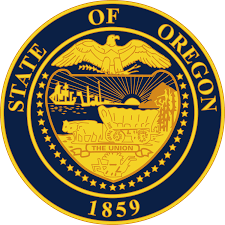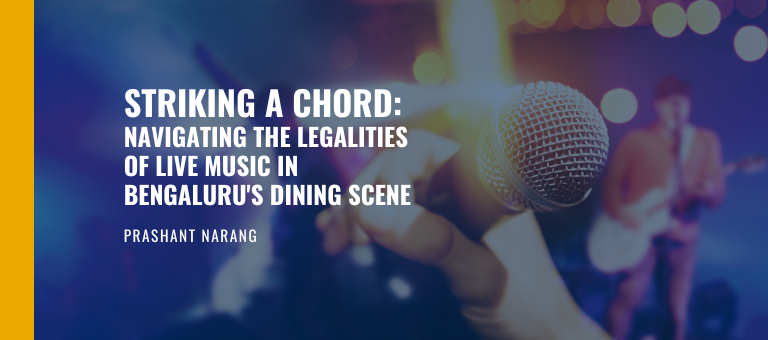Hawaii House Committee on Health and Homelessness
February 8, 2024
Oregon House Committee On Behavioral Health and Health Care
February 20, 2024Striking a Chord: Navigating the Legalities of Live Music in Bengaluru’s Dining Scene
Prashant Narang
Introduction
In Bengaluru, India’s hub of innovation and tech, a legal puzzle involving live music performers stirred the city’s vibrant cultural and nightlife scene. Here’s the quirky part: musicians don’t need a license to play their tunes, but the venues hosting them do. What it means: although artists aren’t directly prohibited from performing, where and how they can share their music isn’t entirely in their hands.
This piece slices through the legal jargon to uncover why Bengaluru’s bars and restaurants encounter obstacles when attempting to offer live music to their customers. It strives to understand the regulations that, in a roundabout way, control musicians’ gigs without outright banning them.
Despite extensive legal discussions, one simple question remains unanswered—why do these rules exist in the first place?
Setting the Stage: The Amusement Order of 1989
Section 31 of the Karnataka Police Act, 1963 talks about how the police can manage traffic, keep public places orderly, and more. It specifically gives the Commissioner and the District Magistrate the power to:
- Licensing places where people go for amusement or entertainment;
- Stop these places from operating if they cause trouble, danger, or inconvenience to people living nearby or passing by;
- Regulating how people enter and leave these places to keep everyone safe and prevent disturbance.
The Police Act makes a clear distinction between ‘place of entertainment’ and ‘place of amusement.’ Section 2 says that places where people eat are considered entertainment spots, and places where there’s music or performances are counted as amusement spots.[1]
In 1989, the Commissioner of Bangalore introduced a special order called the “Amusement Order” for regulating places of amusement in the city.[2]
The License Limbo: Bars, Bands, and Bureaucrats
In Bangalore, restaurant owners had a CL-9 License under the Karnataka Excise Licenses (Sale of Indian and Foreign Liquors) Rules, 1968, allowing them to sell liquor along with food or other refreshments.
In the late 1980s, they began to offer live band music to create a more enjoyable atmosphere for dining and drinking.
Everything went well until 1995, when the Licensing Authority started denying licenses for live band music in these establishments.
The reason? According to the licensing authority, Rule 11 of the Excise License Rules did not allow dance or entertainment in places licensed to sell liquor and vaving live music in a liquor-licensed establishment would be a violation of the Excise License terms.[3]
Wait, but how does that make them ineligible for an amusement license?
Is live music “entertainment” or “amusement”?
Further, restaurant and bar owners argued that their establishments were “places of entertainment”, not “amusement”, as per the definitions provided in the law, and thus should not be barred from hosting live music.
When they challenged this decision in court, Justice Raveendran of the Karnataka High Court ruled that the Licensing Authority should have given the applicants a chance to present their case before rejection.[4]
Despite the judicial direction, the Licensing Authority refused to change its stance in 1997, repeating the same reasons for denial without hearing or sharing any reasons. A subsequent judgment noted this disregard for the court’s order but took no action against the Licensing Authority.
Each year, restaurant owners had to apply all over again because the rules didn’t allow for simply renewing their music license.
Restaurant owners applied once more to include live music, arguing they had made the necessary adjustments to separate the music and liquor areas as per the regulations. They claimed the Licensing Authority had previously approved these arrangements, a claim the Authority denied. Despite briefly issuing licenses for live music in 1997, the Licensing Authority reverted to denying these applications in 1998, citing similar reasons as before, leading to ongoing legal and operational challenges for the restaurant owners.
Solo Act: The Single Judge’s Ruling in Favor of the Beat
The matter came before Justice T S Thakur of the Karnataka High Court.[5]
Justice Thakur highlighted that Rule 11 refers to “any kind of entertainment” and not “any kind of amusement.” As per the Police Act, a ‘place of public entertainment’ meant venues that serve food and drinks. This broad interpretation could ironically ban food and drinks in liquor-licensed establishments, contradicting the essence of a CL-9 license. Thus, ‘entertainment’ in Rule 11 must be construed narrowly, especially since it’s mentioned right next to “unlawful act” in the rule. It meant the kind of entertainment that could actually cause trouble, not just any activity that makes a place more enjoyable—like live music.
Justice Thakur further questioned the logic behind banning music in liquor-serving establishments. Here is the exact quote from Justice Thakur:
It is not the case of the Respondents that music has a delirious effect on those who enjoy a drink. The argument on the contrary, was that music is pure, music is vidya,[6] it is Saraswati[7] and therefore should not be allowed to be mixed with liquor. It was also contended that music over a cup of tea or coffee is different from music over a drink. I have, I must confess failed to appreciate the rationale behind this reasoning which accepts music as gentle, pure and even sacred but suggests that its benign presence can be tolerated only if no liquor is served in the place. The argument in other words is that since liquor is bad those in the Company of Baechus must have no distractions. It is difficult to discover the logic behind that reasoning. No one can claim that he has a right to consume alcohol, and if liquor is considered bad, the State can and ought to introduce prohibition which is one of the directive principles also. But having permitted consumption of alcohol, in places of public entertainment, how far can, the State or the Rule making authority be justified in keeping out from such places what is otherwise perfectly legal and harmless.[8]
Justice Thakur noted the longstanding practice of restaurants obtaining licenses for live music without incidents suggesting it led to immoral activities, reinforcing the notion that live music is not inherently disruptive to social or moral order.
He ruled that Rule 11 does not inherently prohibit live music in establishments with a CL-9 license. This decision was pivotal, allowing these venues to offer live music as a legal and harmless form of entertainment.
The court also examined whether an amusement license was required for live music, especially when no admission fee was charged. Justice Thakur focused on the Act’s definition of amusement, determining that a license was necessary regardless of admission charges.
Harmony or Discord? The Division Bench’s Counterpoint
When the Licensing Authority challenged the decision to allow live music in restaurants and bars, Justices R. P. Sethi and Mohammed Anwar heard the appeal.[9]
They decided that live music falls under the category of ‘Entertainment.’ And that the Licensing Authority may refer to conditions beyond the Amusement Order, such as Rule 11 of the Liquor Rules to decide and reject the license for live music. The judges said it’s important to look at all the laws and rules that apply when making a decision about giving out a license for live music.
The judges then said that live band performances are considered ‘public amusement’—a type of entertainment that needs a special license according to the 1989 Licensing Order for Public Amusements in Bangalore. This law says that places that want to have live music need to get a specific kind of permission.
They also pointed out a rule in the Amusement Order that banned smoking or drinking in places licensed for public amusement. This rule is for businesses that have gotten this special license.
“In the end, the judges agreed with the decision to not give out licenses for live music to liquor licensed premises.”
The Final Note: Supreme Court’s Symphony
The matter came before the Supreme Court, with Chief Justice G B Pattanaik, Justice HK Sema, and Justice SB Sinha.[10]
Restaurants and bars argued that they are places where people come to eat and drink, which the law calls “places of entertainment.” They believed they shouldn’t need a special music license according to the 1989 Licensing Order because they mainly serve food and drinks, not primarily music or games. They pointed out that the law treats “places of public amusement” (like music and dance halls) and “places of public entertainment” (like them) differently.
The Supreme Court found that as per the law, “places of public amusement” are specifically for music, singing, dancing, or gaming, and that’s mainly what they do. But just because a restaurant or bar has live music doesn’t turn it into a “place of public amusement.” The Court said that the 1989 Amusement Order doesn’t apply to these eateries and drink spots since they are fundamentally “places of public entertainment” where music is just a side attraction.
In essence, the Court found that restaurants and bars don’t change into amusement venues just because they offer live music.
Conclusion
The legal tussle over live music in Bengaluru’s dining establishments isn’t just about permits and policies; it’s a deeper inquiry into the balance between regulation and the vibrancy of urban life. At the heart of this saga is a critical question largely left unexplored by the final judicial verdicts: Does the blend of liquor and live music inherently contribute to trouble, danger, or inconvenience to residents and passersby? Notably, this concern arises in a legal framework that does not extend the same scrutiny to recorded music, highlighting a curious distinction in the perceived impact of live versus recorded performances.
Justice Thakur, in his probing, came closest to addressing this core issue, questioning the logic. The Division Bench, in its interpretation, seemed to veer sharply to uphold a restrictive view. The Supreme Court, while providing a legal reprieve for bars and restaurants by distinguishing them from places of amusement, sidestepped the opportunity to delve into the foundational rationale of the regulations. This oversight leaves a gap in the legal discourse, where the underlying objective of the licensing statute—to mitigate trouble, danger, or inconvenience—remains only superficially addressed.
[1] Here are the relevant provisions for ready reference:
Section 2(14) – “place of public amusement” means any place, where music, singing, dancing, or any diversion, or game, or the means of carrying on the same is provided and to which the public are admitted and includes a race course, circus, theatre, music hall, billiard room, bagatelle room, gymnasium, fencing school, swimming pool or dancing hall.”
Section 2(15) – “place of public entertainment” means any place to which the public are admitted and where any kind of food or drink is supplied for consumption on the premises by any person owning or having an interest in or managing such place and includes a refreshment room, eating house, coffee house, liquor house, boarding house, lodging house, hotel, tavern, or a shop where wine, beer, spirit, arrack, toddy, ganja, or other kind of liquor or intoxicant or any kind of food or drink is supplied to the public for consumption in or near such shop.”
[2] “The Licensing and Controlling of Places of Public Amusements (Bangalore City) Order” This order is not available online. The discussion is based on references made in various court judgments.
[3] Here is Rule 11 of the Karnataka Excise Licences (General Conditions) Rules, 1967:
(1) No gambling, dance, gathering, feast or any kind of entertainment or unlawful act shall be permitted in such premises.
(2) The licensee shall sell liquor only in the approved shop and shall not sell in such premises any article other than such article and except to the extent permissible in accordance with the terms of the licence”
[4] Khaleel Ur Rehaman and Others v Commissioner of Police, Bangalore as referred to in R. Shankaregowda v Commissioner of Police (1998) 03 KAR CK 0049.
[5] Shankaregowda v Commissioner of Police (1998) 03 KAR CK 0049.
[6] Vidya means learning, knowledge, or skill.
[7] Saraswati is Hindu Goddess of Learning and Knowledge.
[8] Para 11.
[9] The Commissioner of Police vs R. Shankare Gowda ILR 1999 KAR 459.
[10] Mohan H Pai v Commissioner of Police 2013 SCC 14 592.


